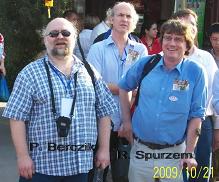NAOC Researchers Received the 2011 PRACE Award

The Silk Road Project team at National Astronomical Observatories of Chinese Academy of Sciences, led by Rainer Spurzem and Peter Berczik, in cooperation with other international collaborators, has received the 2011 PRACE Award of the International Supercomputing Conference ISC11:
http://www.prace-project.eu/news/the-prace-award-winners-2011-announced
with the paper:
Title: Astrophysical Particle Simulations with Large Custom GPU Clusters on Three Continents.
Authors: Rainer Spurzem, NAOC CAS & University of Heidelberg; Peter Berczik, NAOC CAS & University of Heidelberg; et al.
The Partnership for Advanced Computing in Europe (PRACE) is an international nonprofit association with its seat in Brussels. The PRACE Research Infrastructure (RI) provides a persistent world-class High Performance Computing (HPC) service for scientists and researchers from academia and industry. The leading PRACE systems form the apex of the performance pyramid and are well integrated into the European HPC ecosystem. PRACE awards a prize to the best scientific paper by a European student or young scientist in one of the following areas: a breakthrough in science achieved with high performance computing resources, algorithms or implementations that achieve significant improvements in scalability, or novel approaches to performance evaluation on massively parallel architectures.
In this award-winning paper, the authors present direct astrophysical N-body simulations with up to six million bodies using their parallel MPI-CUDA code on large GPU clusters in Beijing, Berkeley, and Heidelberg, with different kinds of GPU hardware. The clusters are linked through the cooperation of ICCS (International Center for Computational Science). On the NAOC cluster, they reach about 1/3 of the peak performance for this code, using a real application with hierarchically blocked timesteps and a core-halo density structure of the stellar system. The code and hardware are used to simulate dense star clusters with many binaries and galactic nuclei with supermassive black holes (SMBH), in which correlations between distant particles cannot be neglected. Now they are using the Mole-8.5 system at the Institute of Process Engineering (IPE, CAS) with more than 2000 GPUs; with this machine, they want to achieve even higher performance. Their work shows that GPU-based high performance computing has tremendous potential in astrophysical research.
Many Chinese and overseas graduate students and postdocs are now doing research under the Silk Road Project initiative, which also closely cooperates with KIAA/PKU, ICT/CAS and IPE/CAS.
Dr. Peter Berczik (NAOC, CAS) and Dr. Guillermo Marcus (Univ. of Heidelberg, Germany) will receive the award certificate at the opening ceremony on behalf of the research team. ISC11 will be held June 19-23 2011 in Hamburg, Germany, and over 2000 like-minded HPC researchers, technology leaders, scientists and IT-decision makers will be present at the conference.